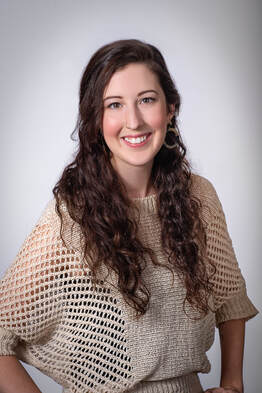|
Master of Social Work
Licensed Clinical Social Worker To make an appointment with Katie, please call 630-570-0050. You can also email [email protected].
Specializes In:High-Functioning Autism Spectrum Disorders, Anxiety Disorders, Obsessive-Compulsive Disorder (OCD), Adjustment Disorders, Grief, Depression, Anger Management for Kids, Non-Suicidal Self-Injury (NSSI), Body-Focused Repetitive Behavior Disorders (BFRB's), Developmental Disorders.
Ages Served: Little Kids (4+), Big Kids, Adolescents/Teens, Adults, Older Adults |
Professional Experience
I received my Bachelor of Art degree in Psychology from Hope College in Holland, Michigan. While studying for my undergraduate degree I interned at a Residential Treatment Center for addictions treatment. I then went on to obtain my Masters of Social Work degree at Aurora University. During this time I had the opportunity to intern at the YWCA in Aurora where I was able to help plan and put on community events, facilitate the Bullying Prevention Peace Program at local schools, and help run a local after school care program. For my advanced internship I interned at a large agency setting conducting individual and group therapy as well as assisting the intake department.
Additionally, during my masters program I held positions as a direct classroom aide at a therapeutic day school and served as a Registered Behavior Technician (RBT) delivering Applied Behavior Analysis (ABA) therapy in home and clinic settings.
While my time as a RBT fostered a deep and lasting passion for working with the neurodivergent community, it is important for me to acknowledge that my values as a provider do not align with the practices common within the field of ABA and that I am personally committed to providing affirming services.
Additionally, during my masters program I held positions as a direct classroom aide at a therapeutic day school and served as a Registered Behavior Technician (RBT) delivering Applied Behavior Analysis (ABA) therapy in home and clinic settings.
While my time as a RBT fostered a deep and lasting passion for working with the neurodivergent community, it is important for me to acknowledge that my values as a provider do not align with the practices common within the field of ABA and that I am personally committed to providing affirming services.
Specializations and Treatment Approach
I currently treat or support those with:
Autism Spectrum
Attention Deficit Hyperactivity Disorder (ADHD)
Generalized Anxiety Disorder (GAD)
Social Anxiety Disorder
Specific Phobias
Obsessive Compulsive Disorder (OCD)
Adjustment Disorders
Depressive Disorders
Grief and Loss
I enjoy working with children, adolescents, and adults. Additionally, I have a special interest in providing support to the Neurodivergent community. In graduate school I consciously chose not to have a specific specialization and instead to focus on generalist practice, because I am a lover of variety!
I would consider one of my lenses of treatment to be Neurodiversity Affirmative Therapy. This means that I will be cognizant of whether the research based best practice to treat an issue is also the best practice when a client’s neurodivergence is taken into account, or if there are special considerations and accommodations to be made. Further, I enjoy and frequently utilize Play and Expressive Therapies, Cognitive Behavioral Therapy (CBT), Exposure-Based Therapies including Exposure and Response Prevention (ERP), and Motivational Interviewing (MI). I believe treatment should be trauma-informed and intentionally inclusive.
Working with me tends to be a more relaxed, less structured experience. Our work is driven by our goals but flexible in the pace and in the manner of reaching those treatment goals. Therapy is supposed to help - not be another chore or obligation, so being understanding of your humanity and fluctuating abilities is key.
Autism Spectrum
Attention Deficit Hyperactivity Disorder (ADHD)
Generalized Anxiety Disorder (GAD)
Social Anxiety Disorder
Specific Phobias
Obsessive Compulsive Disorder (OCD)
Adjustment Disorders
Depressive Disorders
Grief and Loss
I enjoy working with children, adolescents, and adults. Additionally, I have a special interest in providing support to the Neurodivergent community. In graduate school I consciously chose not to have a specific specialization and instead to focus on generalist practice, because I am a lover of variety!
I would consider one of my lenses of treatment to be Neurodiversity Affirmative Therapy. This means that I will be cognizant of whether the research based best practice to treat an issue is also the best practice when a client’s neurodivergence is taken into account, or if there are special considerations and accommodations to be made. Further, I enjoy and frequently utilize Play and Expressive Therapies, Cognitive Behavioral Therapy (CBT), Exposure-Based Therapies including Exposure and Response Prevention (ERP), and Motivational Interviewing (MI). I believe treatment should be trauma-informed and intentionally inclusive.
Working with me tends to be a more relaxed, less structured experience. Our work is driven by our goals but flexible in the pace and in the manner of reaching those treatment goals. Therapy is supposed to help - not be another chore or obligation, so being understanding of your humanity and fluctuating abilities is key.
About Me
What are your professional and personal values?
Humility is paramount to me. I understand that seeking support can be the undertaking of a lifetime, and that a gentle, humble provider can ease the discomfort that comes with change and uncertainty. I also believe that while I may be the expert in interventions, that you are the expert in your own experience and that our work will be most successful when we are a team.
Respect. Every session I conduct has a foundation of respect. I believe if therapy is going to be successful, I have to respect your insights, your decisions, and your boundaries. Your say is final. You are the captain of this ship.
Knowledge/Integrity. The more knowledgeable and confident I am, the more knowledgeable and confident you’ll be both in treatment and yourself! The combination of these two values for me is very much my personal guarantee that when you walk into my office I will have a foundation of knowledge to help you, and if I don’t think I can, then I will help you find you someone who will.
Compassion is a non-negotiable ingredient in therapy for me. I think everyone is deserving of compassion no matter what the situation, and I want to give you a space to experience compassion, and grow your own sense of self-compassion.
Fun. I love fun! Therapy can be heavy. LIFE can be heavy. So a balance of fun and levity when appropriate can make all the difference.
What are some adjectives you would use to describe yourself and why?
I would describe myself as warm, sunny, relatable, and empathetic. I strive to be knowledgeable yet humble. Encouraging but patient. Goofy but grounded. I make an intentional effort to show up for you as the most authentic version of myself because that’s exactly what I’m asking of you.
What led you to decide that you wanted to be a therapist?
When I reflect on my decision to become a therapist it feels almost as if it was never really a decision but more the “role I was born to play” so to speak...more an inevitability. I think a combination of things that I personally value as well as natural strengths lead me to that decision. I have always wanted to be a helper, always had an urge for altruism. Combine that with a fascination with human behavior and why we are the way we are. And lastly some very strong fantasies of making the world a better place. And I’m aware this is all corny - but I don’t think there’s anything wrong with that! My authentic self IS corny.
What are some of your favorite self-care activities?
For self-care I love spending time with my dog, Miller, and my cat, Goose. I also like spending time outdoors, particularly in sunny and warm weather. I also enjoy playing mentally stimulating games. A few of my favorites are checkers, chess, and Scrabble. I also love “playing” Jeopardy (i.e., excitedly shouting answers at the TV). As a special treat I love vintage and antique shopping. I adore spending a few hours admiring treasures.
What is your favorite quote/some of your favorite quotes?
It’s so tough to choose a favorite! One of my favorites that I find myself repeating often came from an ADHD training and is “If the first step is overwhelming, the first step is too big.” The obvious value in this quote is its use in teaching people how to break down tasks such as cleaning, or writing an essay. However, I think it’s value extends far beyond those applications, and well into tackling any goal in life you may want to form. There’s an undercurrent of empathy and understanding in that quote. There’s no judgment about experiencing overwhelm, only validating that things will be overwhelming and it’s okay to sometimes do less.
What’s the most profound, meaningful, or interesting thing you’ve learned or experienced as a mental health professional? Why do you love being a mental health professional?
One of the most meaningful aspects of being a mental health professional for me is the ability to engage in concurrent growth. To me this means that while I’m working to support a client towards their goals and their personal growth, I am also offered the opportunity to grow myself. My clients have unknowingly showed me a world of different perspectives and values, different experiences, different cultural beliefs/practices and SO much more! This has not only been invaluable to me as a clinician but also knowledge I take with me wherever I go. I can say confidently and with ease that being a therapist has made me a better person.
Humility is paramount to me. I understand that seeking support can be the undertaking of a lifetime, and that a gentle, humble provider can ease the discomfort that comes with change and uncertainty. I also believe that while I may be the expert in interventions, that you are the expert in your own experience and that our work will be most successful when we are a team.
Respect. Every session I conduct has a foundation of respect. I believe if therapy is going to be successful, I have to respect your insights, your decisions, and your boundaries. Your say is final. You are the captain of this ship.
Knowledge/Integrity. The more knowledgeable and confident I am, the more knowledgeable and confident you’ll be both in treatment and yourself! The combination of these two values for me is very much my personal guarantee that when you walk into my office I will have a foundation of knowledge to help you, and if I don’t think I can, then I will help you find you someone who will.
Compassion is a non-negotiable ingredient in therapy for me. I think everyone is deserving of compassion no matter what the situation, and I want to give you a space to experience compassion, and grow your own sense of self-compassion.
Fun. I love fun! Therapy can be heavy. LIFE can be heavy. So a balance of fun and levity when appropriate can make all the difference.
What are some adjectives you would use to describe yourself and why?
I would describe myself as warm, sunny, relatable, and empathetic. I strive to be knowledgeable yet humble. Encouraging but patient. Goofy but grounded. I make an intentional effort to show up for you as the most authentic version of myself because that’s exactly what I’m asking of you.
What led you to decide that you wanted to be a therapist?
When I reflect on my decision to become a therapist it feels almost as if it was never really a decision but more the “role I was born to play” so to speak...more an inevitability. I think a combination of things that I personally value as well as natural strengths lead me to that decision. I have always wanted to be a helper, always had an urge for altruism. Combine that with a fascination with human behavior and why we are the way we are. And lastly some very strong fantasies of making the world a better place. And I’m aware this is all corny - but I don’t think there’s anything wrong with that! My authentic self IS corny.
What are some of your favorite self-care activities?
For self-care I love spending time with my dog, Miller, and my cat, Goose. I also like spending time outdoors, particularly in sunny and warm weather. I also enjoy playing mentally stimulating games. A few of my favorites are checkers, chess, and Scrabble. I also love “playing” Jeopardy (i.e., excitedly shouting answers at the TV). As a special treat I love vintage and antique shopping. I adore spending a few hours admiring treasures.
What is your favorite quote/some of your favorite quotes?
It’s so tough to choose a favorite! One of my favorites that I find myself repeating often came from an ADHD training and is “If the first step is overwhelming, the first step is too big.” The obvious value in this quote is its use in teaching people how to break down tasks such as cleaning, or writing an essay. However, I think it’s value extends far beyond those applications, and well into tackling any goal in life you may want to form. There’s an undercurrent of empathy and understanding in that quote. There’s no judgment about experiencing overwhelm, only validating that things will be overwhelming and it’s okay to sometimes do less.
What’s the most profound, meaningful, or interesting thing you’ve learned or experienced as a mental health professional? Why do you love being a mental health professional?
One of the most meaningful aspects of being a mental health professional for me is the ability to engage in concurrent growth. To me this means that while I’m working to support a client towards their goals and their personal growth, I am also offered the opportunity to grow myself. My clients have unknowingly showed me a world of different perspectives and values, different experiences, different cultural beliefs/practices and SO much more! This has not only been invaluable to me as a clinician but also knowledge I take with me wherever I go. I can say confidently and with ease that being a therapist has made me a better person.
Professional Memberships
National Association of Social Workers (NASW)
Children and Adults with ADHD (CHADD)
Children and Adults with ADHD (CHADD)
Blogs:
|
I’m often met with a certain fascination when meeting someone new and disclosing my role as a therapist. I notice that some people are quick to use that opportunity to ask me their burning questions about the therapeutic process, as if I’ve lifted the veil and given them a glimpse into a secret, mysterious, off limits realm...(to read more, click on the link above)
|
|
Across Illinois, many schools are beginning, or have begun their first few weeks of full remote instruction. With this, comes the potential for overwhelming uncertainty. Will they adjust? What is my role as a parent? Am I doing too little? Am I doing too much? Here are a few suggestions to ease the possible uncertainty as we move forward...(to read more, click on the link above).
|





